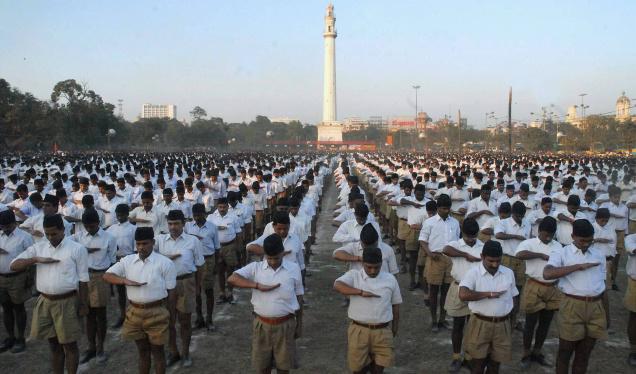The Growing Fangs of RSS
By Aayush Anand
22 October, 2015
Countercurrents.org

RSS chief Mr.Mohan Bhagwat in his speech on last year's Vijayadashmi said " Humanity can live a happy, praceful and beautiful life only when we understand and follow the principles of loving and accepting the plurality inherent in nature; move with a sense of coordination, cooperation, empathy and dialogue and adopt the path of non vioence and constitutional middle path instead of practicing unilateral fanatacism and violence in our practices in matters related to ideological and religious conduct." The facade of benevolence becomes painfully obvious when the next day there were reports in the media about communal violence with alleged links to RSS. Such incidents which have RSS as the supposed perpetrators are numerous and one cannot help but wonder why RSS has not been termed anti-national and disbanded. But rather the motion is in complete contradiction to preferred choice.
Mr. Mohan Bhagwat, who caan be rightly considered as the spokesperson of the group has stated many a times that " India is a hindu nation and Hindutva is its identity." Though Hinduism and Hindutva are two words being used interchangeably, they have different connotations. Mixing of these words cater to their agenda to appropriate Hinduism. According to the historian Sumit Sarkar, the evolution of Hindu nationalism in India has gone through three phases - Hindu, Hinduism and Hindutva. While Hindu referred to people living in a particular geographical area, Hinduism was popularized by Swami Vivekanand who substantiated the theological explanation for the religious and cultural practices of Hindus, during the late 19th century. Hindutva was coined by Veer Savarkar in his 1923 treatise, Hindutva- Who is Hindu. According to which a person qualifies as Hindu, only when he considers India his fatherland and holy land- a definition that excluded Christians and Muslims, who consider Palestine as holy land. In retrospect, Hindutva comes out as political Hinduism. With such deep rooted religious bigotries in their belief its hardly a doubt that their liberal speeches are hypocritical and farcical.
The BJP has been ambiguous on the link with RSS because of its realization that the RSS does not go down well with an average Indian. It was the same question that split the Janata Party. The Jana Sangh, the earlier manifestation of the BJP, promised to cut its links with the RSS when it formed the Janata Party and gave an assurance to Gandhian Jayaprakash Narayan. Though the delinking did not happen but in the process the Jana Sangh was able to get secular credentials. The blunder committed by JP has cost the nation dear and the Jana Sangh of yesterday has emerged as the BJP of today and has been able to secure an absolute majority in the Lok Sabha.
It is not an uncommon knowledge that RSS is responsible if not completely atleast partly in establishment of the "Saffron terror" neologism. Years of promoting intolerance and hatred have caused the saffron brigade to tether on the edge of terrorism. Rohin Salian, special public prosecutor in the 2008 Malegaon blast case, has blown the cover on an open secret , that is the state's reluctance to prosecute saffron terror. In a raft of terror cases that emerged in the 2000s and implicated Hindu extremists, state responses followed a familiar pattern, of denial, cover-up and delay.
If there was any doubt left about the influence of Rashtriya Swayamsevak Sangh' on government, it was dispelled with recent incidents. Mr. Narendra Modi presented his key ministers to RSS chief and asked them to provide information on the working of their ministries. That the prime minister had no reservation about it was evident from the way the entire presentation was aired on news channels. RSS has come out openly on the field now to guide the BJP, metamorphosing from its role of being a pure cultural organisation.
India's first home minister Sardar Patel, following the assassination of Mahatama Gandhi, banned the RSS and in a communique on February 4, 1948 said that "The objectionable and harmful activities of the Sangh have, however, continues unabted and the cult of violence sponsored and inspired by the activities of the Sangh has claimed many victims. The latest and the most precious to fall was Gandhiji himself." Following much deliberation and pleading the ban was lifted but not before RSS accepted all the conditions set by the government including that it shall remain a 'cultural organisation' 'eschewing secrecy and abjuring violence'. Today most of the ministers in the federal cabinet have their political consciousness shaped by the RSS. Mr. Modi himself has spent his formative years as a volunteer in the group. BJP President Amit Shah and seven other members of Modi's cabinet also joined the RSS in their youth.
RSS has grown and so has its influence but its ideologies have remained archaic. Alas, it did not grow to become a utilitarian tree but a fatal wound which is turning into cancer. Its time the bluff is called and people realize the unwarranted hold RSS has in governance decision and the dark path the country will be led onto if not heeded urgently. India needs tolerance to prosper, not a 'Hindutva' identity that is sure to split up the society.
Aayush Anand is an avid blogger and information security enthusiast. Blog at www.beyond-the-static.com.


